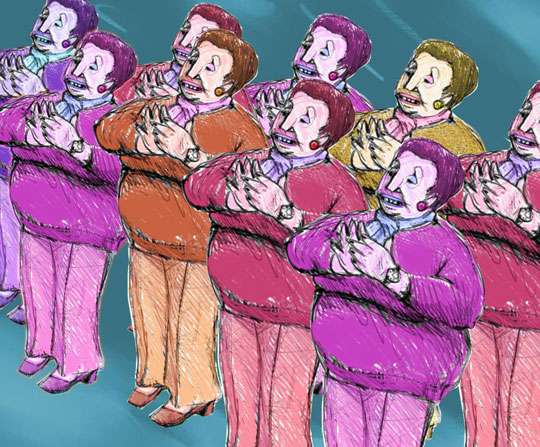O que é que andam a fazer exactamente os canais de TV terrestre em Portugal?
Não conheço quase ninguém que ainda acompanhe a sua programação, para além do telejornal da noite, o que já é um enorme desafio. Quem é que, às oito da noite, tem uma hora e meia ou duas horas para se sentar a ver tantas notícias, embora de facto não sejam muitas notícias, mas apenas três ou quatro histórias, espremidas até a última gota para encher a primeira hora (o contrário da ideia de soundbites).
Há reportagens de tiro rápido, filmadas na rua por jornalistas sem fôlego, sempre com “vox pops” de demasiadas pessoas com demasiadas coisas para dizer, mas que nunca acrescentam substância ou informação à notícia. No fundo, o vox pop da rua é o equivalente das caixas de comentários “below the line”. Depois segue o futebol, que enche o resto da programação. Poucos outros desportos aparecem.
Umas vezes, o telejornal fica num canto da sala como papel de parede. Outras vezes, é simplesmente ignorado.
Ao fim da noite, aparecem os tudólogos, sempre as mesmas caras cada semana, sempre nas mesmas discussões (ou não-discussões) sobre pormenores que pouco interessam à maior parte da gente, que naturalmente não vive obcecada pela política.
As horas do dia enchem-se com “shows” fúteis, feitos para velhotas pouco curiosas e capazes de se pasmarem perante muita coisa. As audiências no estúdio são compostas de mulheres de meia-idade ou velhotas com penteados grandes e pullovers justos, que seguem as deixas dos apresentadores para se rirem ou fazerem caras tristes nos sítios certos.
Depois, aos fins de semana, há os programas que seguem as festas dos santos pelo país todo, com apresentadores-palhaços entusiasmados pelos produtos do região, entrevistando os produtores de enchidos e cerâmica, tal como fazem em todas as cidades, todas as semanas, como se ainda ninguém soubesse o que é um chouriço ou um prato decorado. Quando a música pimba começa a tocar, a multidão salta devidamente e bate palmas, com as velhotas aparentemente indiferentes ao facto de o cantor estar apoiado por bailarinas, moças com idade para serem suas netas, e que não dançam muito bem mas que, praticamente nuas, mexem bem os cabelos, os rabos e os dentes para as câmaras.
A pior praga são as telenovelas, um disparate emitido durante horas, horas e horas em todos os canais terrestres durante a semana toda. Aos guiões falta quase tudo, de timing a interesse. Tudo consiste em histórias de homicídio, vingança e discussões de dinheiro e/ou amantes e, sem qualquer explicação, toda a gente parece ter criados que usam fardas. A representação é escandalosamente horrível, dando à nação (e a todas as nações onde se vendem as telenovelas portuguesas) a ideia de que a ficção televisiva é isto. Mas isto não é ficção televisiva. Nem é representação. Os solilóquios são especialmente hilariantes: os actores entram num quarto e falam com eles próprios. É que na telenovelalândia portuguesa não há diálogos internos expressos através da representação, porque ninguém sabe representar.
Esta infantilização do país que se chama televisão é pontuada por pausas para publicidade que são mais longas do que os programas, e durante as quais perdemos a vontade de viver, depois de vermos o mesmo anúncio três ou quatro vezes. Ou desligamos a televisão ou enfiamos um tijolo pelo écran.
Há, obviamente, uma audiência para estas tretas do dia e da noite… por enquanto. As pessoas que veem e gostam disto não conhecem outras coisas, e continuam a ver e a gostar, e a acreditar que isto é que é televisão. As velhotas sem curiosidade devem gerar rendimentos suficientes para que os canais continuem. Para já. Mas no futuro, o que poderá acontecer?
O que será quando a geração das velhotas sem curiosidade desaparecer, para ser substituída por uma geração mais sofisticada que nunca viu a televisão terrestre porque está agora a ver os canais americanos? Na televisão terrestre, não há uma evolução visível nas espécies de programação feitas. Não há ficção nacional (não… repito, telenovela não é ficção, é treta), não há comédia que valha uma menção, os documentários são tão raros como os dentes de uma galinha, e quando existem são entediantes até chega.
Um dia, a pimbalhada vai deixar de cativar as pessoas, ninguém ligará mais para as linhas de valor acrescentado para ganhar €1000, os “game shows” deixarão de receber autocarros das aldeias e talvez, um dia, as pessoas comecem a não apreciar a humilhação das audições dos “talent shows”.
Não haverá rendimento. E a televisão terrestre deixará de ser viável.
O que é que eles julgam que estão a fazer exatamente?
TV heading to extinction.
What on earth do terrestrial tv channels in Portugal think they are doing?
Almost no one I know watches anything on terrestrial tv anymore, apart from the news at night. Even then, it’s a struggle to watch with any attention. Who, at eight o’clock in the evening has an hour and a half to two hours spare to sit and and watch that much news? It’s not even that much news, but three or four stories, dragged out to extraordinary lengths, the very polar opposite of a soundbite, to fill the first hour.
Pointlessly rapid fire, breathless reports from reporters in the street with the rest of the segment filled with vox pops from too many people with too much to say, adding no substance or information to any piece of news. I have never met a single person who thinks that the street vox pop is of any more value to a discourse than below the line comment boxes. Then football, of course, fills the rest. Barely any other sport gets a look in.
At best, the evening news sits in the corner being wallpaper. At worst, it is just ignored.
At the end of the night, come the pundits and the debates, the same old faces wheeled out every week to have the same arguments and non-arguments with each other about details that mean nothing to anyone apart from the utterly politically obsessed.
The daytime is filled with the inane live chat and variety shows, made for incurious old women who seem to be amazed by everything. The live studio audiences are populated by late middle age women with big hair and tight sweaters, taking their cues from the presenters to laugh proportionately when they are supposed to and put on sad concerned faces when they are supposed to.
Then there are the interminable weekend live shows that follow the saints’ festas around the country, with whacky presenters being jolly and enthused by local produce, interviewing producers of enchidos and ceramics, just as they do in every other town, every other week, as if no one has ever seen a chouriço or a decorated plate before. When the pimba starts, the crowds dutifully bounce and clap along to the beat, the old ladies seemingly unconcerned that the pimbo pimba-ing his pimbalhaço on the stage is flanked by two hotties who are young enough to be his granddaughters, who can’t dance particularly well, but can flick their hair sexily and grin at the cameras in their next to naked state.
The greatest curse are the telenovelas, nonsense aired for hours and hours and hours each day of the week, across all the channels. The long-winded scripts are preposterous, devoid of timing, propelled by plotlines of murder and revenge and arguments over money and/or lovers, and inexplicably there are many uniformed servants. The acting is scandalously bad, giving a whole nation (plus all the nations where Portuguese telenovelas are sold) the idea that this is what drama IS. This is not what drama is. Nor is this what acting is. The soliloquies are the best comedy, when actors go into their bedrooms and talk to themselves, because in telenovela land, no one can have an internal dialogue that is expressed through acting, because they can’t act.
All this infantilisation called television is punctuated with ad breaks that are longer than the programmes themselves in which we lose the will to live when we see the same ad three or four times in one break and either turn the tv off or put a brick through it.
There is obviously an audience for the the daytime drivel and the night time drivel… at the moment. The people who watch it and like it have never known anything else and continue to watch it, believing that this is what television is all about. The incurious old women generate enough revenue to keep the channels going. For now. But what of the future?
What will happen when the generation of incurious old women is gone, and is followed by a vastly more sophisticated generation who has never watched any of the terrestrial channels, because they are watching the American cable channels? In terrestrial tv, there is no visible evolution in the type of shows being made. There is no homemade drama (no. telenovelas are not drama, they are drivel), there is no comedy worth mentioning, documentaries are as rare as hens’ teeth and boring beyond comprehension when they are made.
The pimbalhada will have no hold on anyone anymore, no one will call in on the scandalously expensive phone lines to try and win a 1000€, the game shows will have no busloads of villagers clamouring to get on the show and maybe, one day, people will even tire of the horrible, humiliating singing contest auditions.
There will be no revenue. Terrestrial tv will cease to be viable.
So what on earth do they think they are doing?













